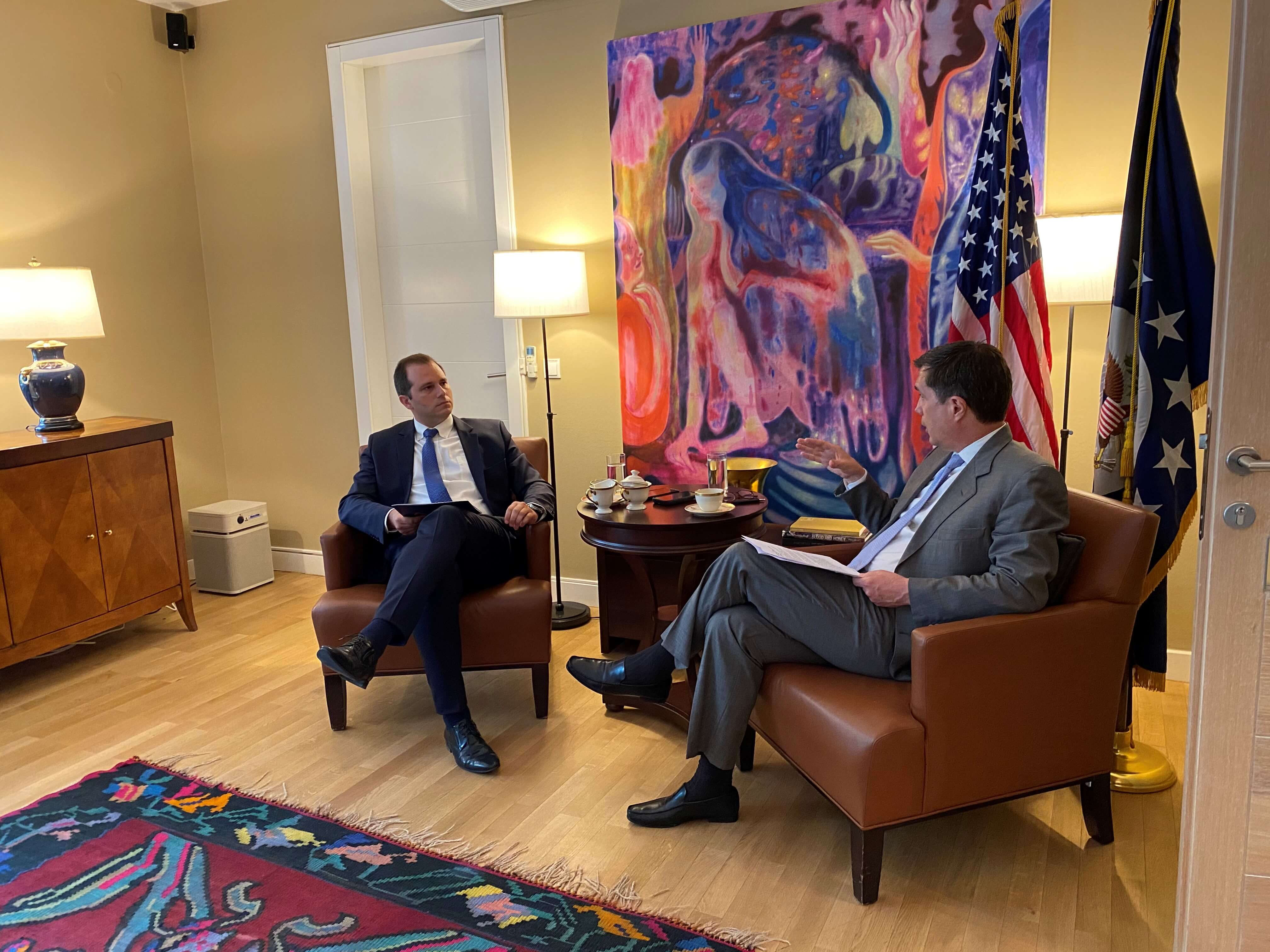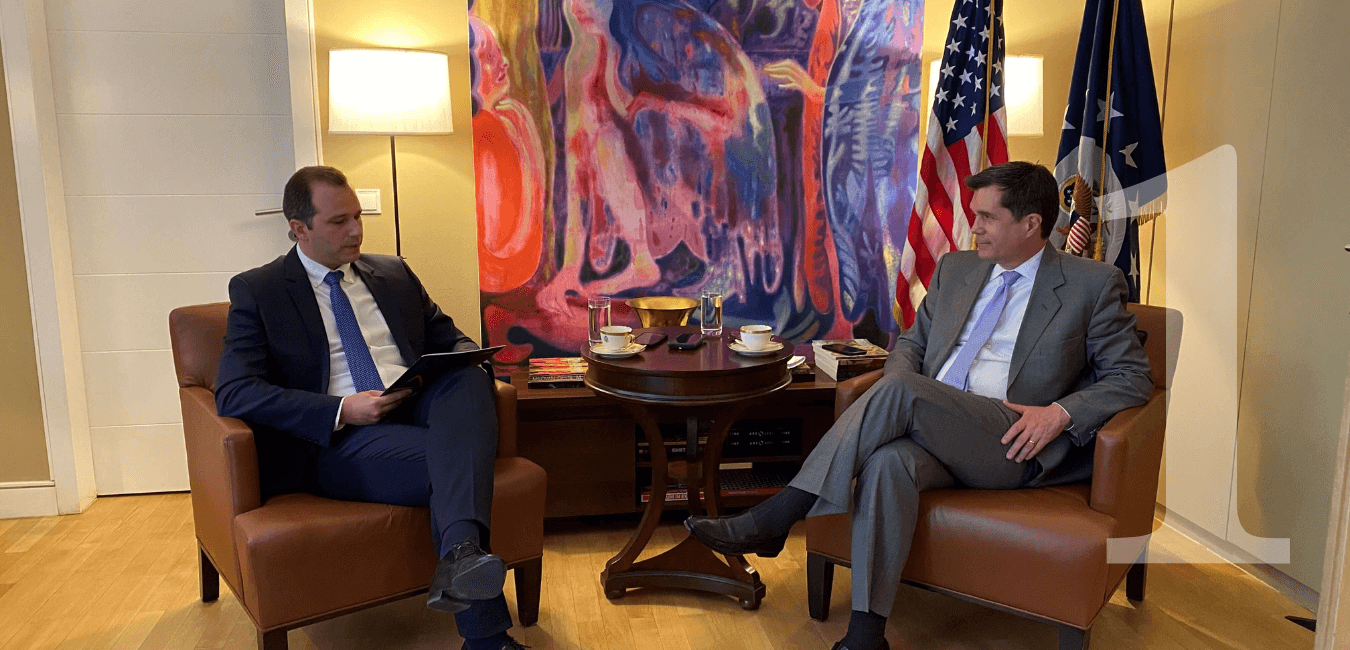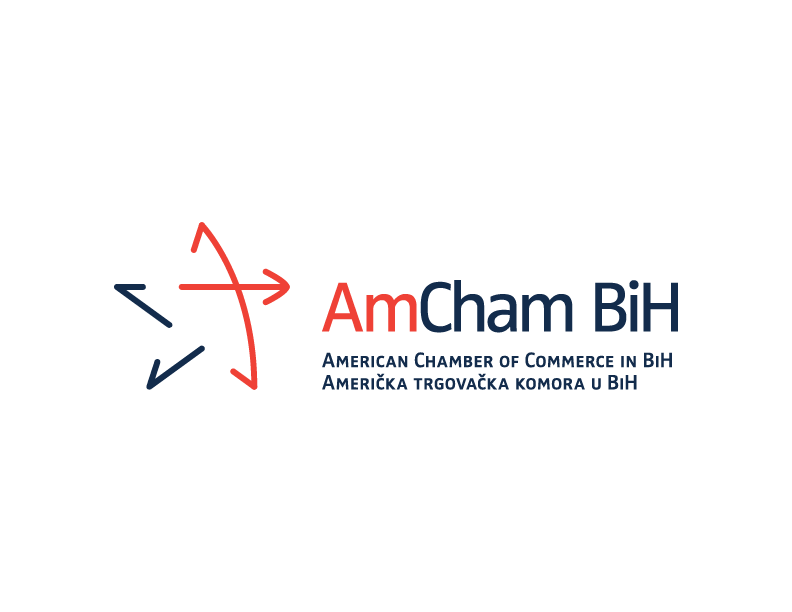Interview with the U.S. Ambassador to BiH, H.E. Eric Nelson
Nedim Hamzic (AmCham): All of us at AmCham are thankful for your and the Embassy’s support for our organization, the members, and our goals. How do you believe AmCham can be most successful and lead change in BiH?
Ambassador Nelson: The American Chamber of Commerce is a very important partner for the US Embassy across the world, bringing together and amplifying the voices of firms that share our objective of creating a better business environment. A business environment governed by the rule of law, legal frameworks that make it easier for firms to create jobs, and a climate that contributes to stability. These are the essential ingredients necessary to create an environment that promotes prosperity. Here in BiH we are very pleased that the chamber’s made some great strides in the last 2 years and increased its membership by 30%.
Nedim: Perhaps even a little bit stronger 35-40%
Ambassador: And you have increased your capacity to support the members and to connect the members to other chambers across the region.
Ambassador: Because the fundamental issue here, is that job creators and business leaders need to have a voice. Political leadership should be listening to business leaders, and collectively your voices will be stronger. So, by joining together in the American Chamber of Commerce, every member’s voice is strengthened and engaged. By joining any of the committees the members can advance their shared interests in BiH. The members of the AmCham have our ear at the US Embassy. Listening to the members helps me as an ambassador make clear to political leaders what’s at stake and why reforms are necessary. Why they need to address improving Bosnia and Herzegovina’s score, for example, on the ease of doing business. It is about standing together, having your voice combined with others so it will be heard, leading to positive change for all in Bosnia and Herzegovina.
Nedim: As you heard during the roundtable in Banja Luka, the business community is interested in driving economic reform throughout the country. What are a couple of the most important reforms that can be attained in the near future? And how can AmCham help make them happen?
Ambassador: In my visit to Republika Srpska I was especially thinking about two signature reforms we consider priorities. One is upgrading the state e-signature law to be compatible with the EU standards. Why is this important? It is very important because the IT sector in BiH has tremendous potential for growth. An IT sector that is compatible and works in an environment that is compatible with EU standards is going to be more successful and attractive to investment. For some reason this requirement is being blocked by some political leaders. There are some short-term interests, different constituencies saying that the upgrade of e-signature law is not acceptable. It is difficult for the US Embassy to understand why that would be. We see clearly that the destiny of BiH is with the EU, and one by one standards need to rise to EU standards. Addressing e-signature first is one of the best opportunities. We are especially interested in this sphere not only for the job increase potential, but we also see that e-governance is an important tool to help the country move forward. Facilitating online transactions, bringing more transparency to government operations is something essential for creating a positive forward motion for BiH and stimulating economic growth. We are investing in this via USAID assistance programs in two ways. One is financial reform activity which we just renewed, promoting transparency in treasury operations and promoting identification and reduction of parafiscal fees. No matter what canton, or entity, or municipality you are in there are multiple fees that businesses have to pay. The lack of transparency around those is a problem, a big obstacle, and a big distraction for businesses. We also invest in activities supporting e-governance which will help governments here that are interested. E-governance can clear through some complicated procedures like permitting. When you can obtain a permit online, it’s much easier and the opportunity for corruption is much reduced. It allows you to deal with a process, not the people who are looking for ways to control or block each step of the process. All of the activity in digitizing government is something that we see as very important. If you cannot get the e-signature law right, none of this makes sense.
Nedim: I agree.
Ambassador: Nedim, I want to mention another important reform that I heard in my conversations in Prijedor with diaspora investors whose SMEs create jobs in the Prijedor region. As they try to create more jobs, one of the obstacles they face is the electricity supply. They have sophisticated equipment and variable or unreliable electricity supply damages this very expensive equipment. What does that have to do with reform priorities in BiH? One of the reform priorities that we are promoting is a state electricity and natural gas law to make BiH compatible with the energy community. This makes a difference because without being in that comparable framework and rising to those standards investors are not interested in putting their money into the energy infrastructure in BiH. So the result is unreliable electricity supply in Prijedor. An unreliable electricity supply damages expensive equipment and makes an investor wonder, why am I trying to run my business here and not in Croatia? Or in any country that has the legal framework to really achieve a coherent energy market that brings in investment so that infrastructure stays up to date and stays reliable. All these reforms have practical implications for business, for individual citizens, and that sadly is too often lost on political leaders. That’s why it’s so important for business leaders to talk about the implications of these reforms and speak up to help amplify my voice as ambassador on why these reforms are important and why these reforms should not be postponed.

Nedim: Speaking of reforms, we are very interested in seeing the e-signature law finalized. How close are we to having e-signature implemented and how would it benefit the BiH economy? What are the biggest obstacles remaining to this important reform?
Ambassador: Regarding the e-signature law and just how close BiH is, it is important to remember that BiH already has a state level e-signature law. The problem is that it is not up to EU standards. So, the argument is not about whether BiH needs a state level e-signature law. The argument is over how strong should it be. This should not be that difficult an undertaking. What are the political objections to updating this law? I do not see the business sense in delaying e-signature. It is important that businesspeople talk about how there is no reason to hold this reform back, because it makes a big difference. There are many reforms needed in BiH. One of the challenges is that there is a lot of hostage taking among the political leaders and an unwillingness to agree to one reform until they get concessions on another reform. And yet this bundling of reforms makes things much more difficult. What is always important in BiH is the need for consensus. Political leaders need to be looking for where they can find consensus to create step by step progress moving the country forward. On economic issues there can and should be a much stronger consensus. So, I urge them at every opportunity, and I hope others will join me in encouraging the kind of practical consensus building that will take care of the economy here. BiH really needs reforms that will power a better recovery from the COVID-19 pandemic. There should be strong agreement on this need and tying these reforms to other agendas is damaging. Hopefully, the business community can join us in making clear the opportunity and the cost of inaction.













